

Bringing the Social Back to MOOCs. Various existing learning environments could scale to MOOC size and benefit learners by adding the social elements now missing, from citizen science to simulations, games, virtual reality, and augmented reality.
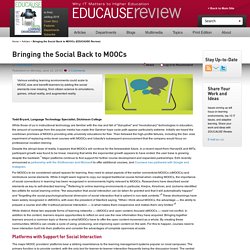
Todd Bryant, Language Technology Specialist, Dickinson College While those of us in instructional technology are familiar with the rise and fall of "disruptive" and "revolutionary" technologies in education, the amount of coverage from the popular media has made this Gardner hype cycle path appear particularly extreme. Initially we heard the overblown promises of MOOCs providing elite university educations for free. Then followed the high-profile failures, including the San Jose experiment of replacing entry-level courses with MOOCs and Udacity's subsequent announcement that the company would focus on professional vocation training.
Despite the abrupt dose of reality, it appears that MOOCs will continue for the foreseeable future. All about MOOCs. MOOCs as granular systems: design patterns to foster participant activity. Shifts-21learning-revised.jpg (JPEG Image, 900 × 654 pixels) How do you measure the ‘success’ of a MOOC? Here’s a question I’ve been battling for some time .. how do you measure the ‘success’ of a MOOC?
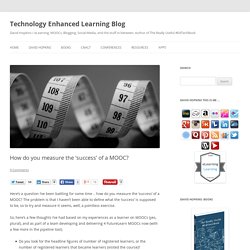
The problem is that I haven’t been able to define what the ‘success’ is supposed to be, so to try and measure it seems, well, a pointless exercise. So, here’s a few thoughts I’ve had based on my experiences as a learner on MOOCs (yes, plural), and as part of a team developing and delivering 4 FutureLearn MOOCs now (with a few more in the pipeline too!). Do you look for the headline figures of number of registered learners, or the number of registered learners that became learners (visited the course)? Do you look for the number at the number of learners who did something, that engaged on the course in some way .. as either a number (e.g. 4,000) or as a percentage of the learners who visited the course (e.g. 40%)?
If you plan your MOOC to link to a paid-for course (degree, training, etc.) do you measure the success by the number of MOOC learners who enquire, or sign-up, to the linked course? MOOC Workshop. Universal Skills All Learners Should Know How to Do. Key characteristics of learners in a digital age and their influence on the design of teaching and learning. 2014-nmc-horizon-report-he-EN-SC.pdf. 01587919.2014.928970. Special edition on research on MOOCs in the journal ‘Distance Education’ TaskForceFinal_July28.pdf. Beyond Assessment - Recognizing Achievement in a Networked World. [All Presentations] Beyond Assessment - Recognizing Achievement in a Networked World Jul 11, 2014 Keynote presentation delivered to 12th ePortfolio, Open Badges and Identity Conference , University of Greenwich, Greenwich, UK. ePortfolios and Open Badges are only the first wave in what will emerge as a wider network-based form of assessment that makes tests and reviews unnecessary.
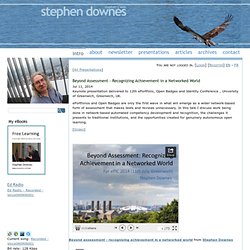
In this talk I discuss work being done in network-based automated competency development and recognition, the challenges it presents to traditional institutions, and the opportunities created for genuinely autonomous open learning. [Slides] [Conference Link] The MOOC Quality Project. MOOCs represent the latest stage in the evolution of open educational resources.
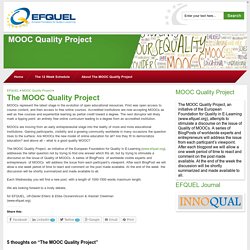
First was open access to course content, and then access to free online courses. Accredited institutions are now accepting MOOCs as well as free courses and experiential learning as partial credit toward a degree. The next disruptor will likely mark a tipping point: an entirely free online curriculum leading to a degree from an accredited institution. MOOCs are moving from an early entrepreneurial stage into the reality of more and more educational institutions. Gaining participants, visibility and a growing community worldwide in many occasions the question rises to the surface: Are MOOCs the new model of online education for all? The MOOC Quality Project, an initiative of the European Foundation for Quality in E-Learning (www.efquel.org), addresses the latter question not by trying to find one answer which fits all, but by trying to stimulate a discourse on the issue of Quality of MOOCs.
European Foundation for Quality in e-Learning. Qualität von MOOCs. The 12 Week Schedule. Qualität von MOOCs - Interview mit Prof. Dr. Ulf-Daniel Ehlers. Universitäre Stellungnahmen zu MOOCs aus Österreich und Deutschland. Position - HRK. HRK-Positionspapier zu MOOCs im Kontext der digitalen Lehre Beschluss des 127.
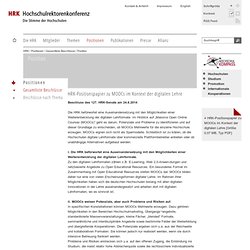
Pro und Contra: Positionen zu Learning Analytics. Unter „Learning Analytics” versteht man die Erhebung und Auswertung von automatisch generierten Daten über Studierende und ihren Lernkontext, z.B.
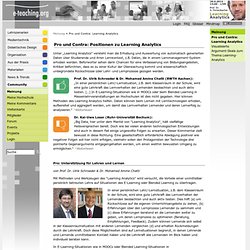
Daten, die in einem Lernmanagement-System erhoben werden. Befürworter sehen darin Chancen für eine Verbesserung von Bildungsangeboten, Kritiker befürchten, dass es zu einer Kultur der Überwachung kommt und wissenschaftlich unbegründete Rückschlüsse über Lehr- und Lernprozesse gezogen werden. Prof. Dr. Technologically Externalized Knowledge and Learning. Let’s take a step back and consider how well we are using learning technology in contrast with what is possible given advances over the last decade. Ideologies influence design, then design constrains future options. We don’t have to look very far to see examples of this simple rule: classrooms, design of organizational work activities, politics, and the operation of financial markets.
7 Things You Should Know About Design Thinking - ELI7109.pdf. Learning Analytics – Der gläserne Lerner. How to MOOC? – A pedagogical guideline for practitioners. Opening Cross-Disciplinary Dialogue: A Virtual Workshop on Methodology (2nd edition 2013) Opening CrOss-DisCiplinary DialOgue: a Virtual WOrkshOp On MethODOlOgy FUniversity of HelsinkiIn collaboration withP L University of Helsinki Interests and priorities in a range of intersecting research disciplines have been changing rapidly.
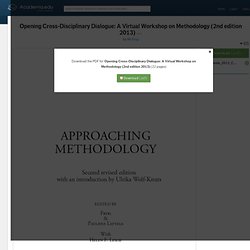
Methods and methodologies have become an increasing concern, yet discussions on these issues have been developing to some degree independently of one another in different fields and in the research traditions of different countries. #Glow — How To Focus In The Age Of Distraction. [Zettelkasteneintrag] Kriterien, nach denen man #web20k und #ldlmooc vergleichen könnte. Zwei “innovative” Veranstaltungen im Hochschulmilieu im Vergleich – anhand 10 ausgewählter Kriterien Just im Rahmen eines CfP kam mir doch die spontane Idee, dass man, wenn zwei offene Online-Kurse schon gleichzeitig laufen, diese gut einander gegenüber stellen könnte.
![[Zettelkasteneintrag] Kriterien, nach denen man #web20k und #ldlmooc vergleichen könnte](http://cdn.pearltrees.com/s/pic/th/zettelkasteneintrag-85675078)
Understanding Research Methods. About the Course This course is about demystifying research and research methods.
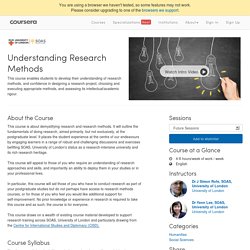
It will outline the fundamentals of doing research, aimed primarily, but not exclusively, at the postgraduate level. It places the student experience at the centre of our endeavours by engaging learners in a range of robust and challenging discussions and exercises befitting SOAS, University of London's status as a research-intensive university and its rich research heritage. HOW TO ANALYZE PARTICIPATION IN A (C) MOOC? - IATED Digital Library. In the US, 2012 was called the year of the massive open online courses (MOOC).
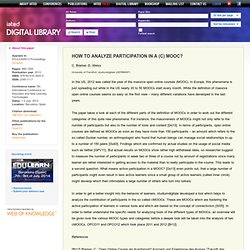
In Europe, this phenomena is just spreading out while in the US nearly 20 to 50 MOOCs start every month. Analyzing MOOCs – A SWOT Analysis. February 5, 2013 by Andrew Spinner One of my many roles at @Understoodit includes conducting onging analysis and research of education technology tools and trends. One of the most interesting and heavily discussed areas relates to what is known as Massive Open Online Courses, or MOOC for short. MOOCs are like your typical university style class – a professor, students, homework, and exams. However, these courses are open to anyone, anywhere in the world, and the majority of them are completely FREE. Using an instructional design perspective to analyze MOOC materials. A facebook conversation from yesterday encouraged me to share one of the assignments that I developed for my instructional design course.
The goal of the class is for the students to understand, experience, and apply instructional design in a variety of educational contexts. MMC13 - die MOOC-Matrix. Articulate Studio '13 ist da! Der Kurztest: Articulate Quizmaker '13 - Rapid - eLearning Blog. What makes a great MOOC? An interdisciplinary analysis of online course student retention - WhatMakesAGreatMOOC.pdf. Das LMS ist nicht tot, das Design schon. Manchmal sieht man den Wald, vor lauter Bäumen nicht. Schon sehr oft wurde das klassische LMS als tot oder gescheitert gesehen. PLEs wurden als Nachfolger auserkoren oder sogar Social Learning Systeme neu erfunden.
Dabei sind LMS wahre Schlachtschiffe, die viel mehr können, als nur didaktische Szenarien zu vermitteln. Ein LMS ist die Schnittstelle zur Infrastruktur, zur Organisation, zur Verwaltung und letztendlich zur Digitalisierung und damit zur Effektivität der Hochschule. Trotzdem sind LMS langweilig. Moodle Design grafisch aufgearbeitet und Responsive. MOOC Etiquette.